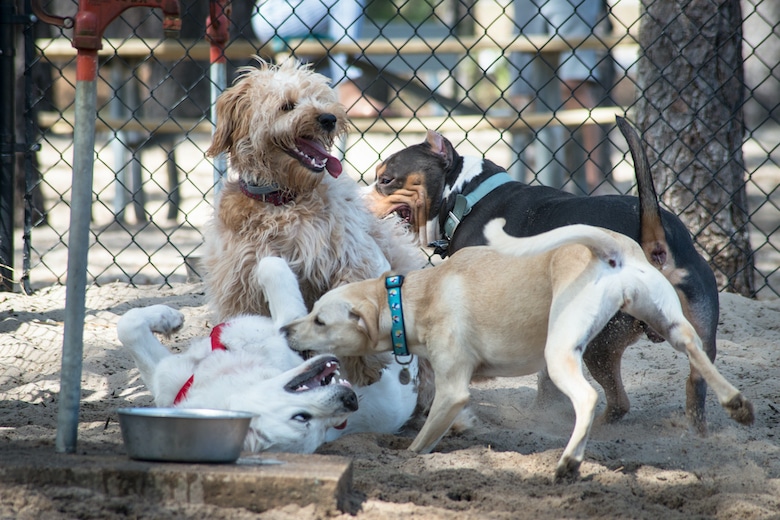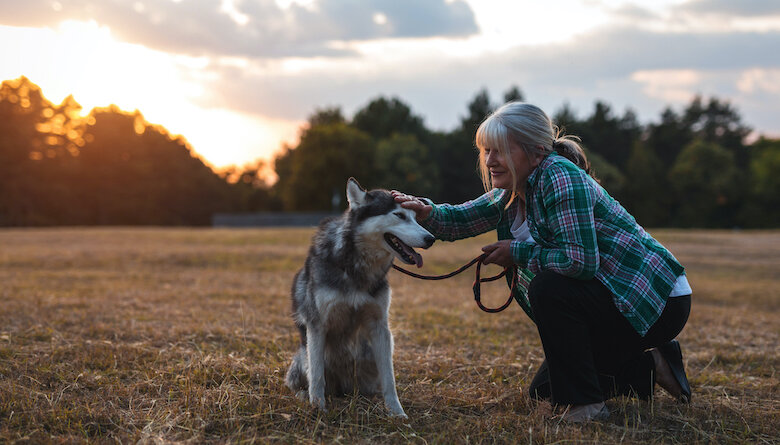What Are They and Why They Are a Winter Risk For Your Dog
[ad_1]
Roundworms are the most common intestinal parasite impacting companion dogs across the country, even dogs who are well cared for and receive regular veterinary care.
They live in a dog’s intestines and feed on the intestinal contents, are light brown or white and several inches long, and resemble spaghetti when in the dog’s intestines. Dogs with roundworms may show small bits of visible evidence of the worms in their poop or vomit.
Unfortunately, roundworms are incredibly common and are spread through dogs (and other animals) shedding the eggs through their feces. Other dogs then become infected by accidentally ingesting roundworm eggs while outside playing.
Dogs of any age from newborn puppies to adults can be impacted by roundworms. Companion Animal Parasite Council (CAPC) which tracks infection rates nationally noted that dog fecal samples across the United States showed that 30 percent of dogs younger than 6 months shed roundworm eggs making this an issue impacting dogs of all ages from puppies to adults. In addition, CAPC studies have found that positive cases of roundworm infection have been detected in dogs in all 50 states across the country.
Why roundworms are the risk in the winter
Dr. Craig Prior, BVSC, CVJ, the former president of the CAPC says that the council’s work on the mapping of roundworm is beginning to show a seasonal prevalence of roundworm. The CAPC releases a monthly update of US cities that have the highest positive percentage increase of roundworms. Bookmark the monthly study (here) to check for updates.
Unlike many other parasites, roundworms are not susceptible to temperature changes, because as Dr. Prior explains “roundworm eggs have a strong protective layer, they are not sensitive to extreme temperatures and can survive in the environment for months — and even years.”
This means our dogs can be susceptible to infection from roundworms year-round, and the risk does not decrease in winter months regardless of where in the country you live.
Curious about roundworm risks in your local area? CAPC parasite prevalence maps give a roundworm prevalence breakdown for every county in the United States.

A small pack of dogs play at a public, off-leash dog park. Photo: Darwin Brandis/ Getty Images
How to prevent roundworms in dogs
The most important thing you can do to protect your dog from roundworm is to keep areas where your dog spends time clean and to not allow your dog to spend time in parks or areas where dog feces are allowed to buildup. Dog waste is one of the primary causes of roundworm spread. All dog parents can help prevent the spread of roundworms by immediately picking up feces when walking our dogs in public areas and regularly from our backyards.
Related: Potty Training Dogs — 9 Tips for Success
Unfortunately, CAPC has discovered that 27% of fecal samples collected in dog parks from across the country showed that roundworm was present. In response to the prevalence of roundworm, CAPC recommends that puppies be tested for roundworm at least four times in their first year of life. CAPC also recommends that adult dogs be tested at least twice a year and that dogs receive monthly broad-spectrum parasite preventative medication year-round.
What are the symptoms of roundworm in dogs?
Symptoms of roundworm infection in dogs include weight loss, diarrhea, dull coat, vomiting as well as a bloated/pot-bellied abdomens. If left untreated a roundworm infection can be fatal to dogs. Although at times you can see worms in your dog’s vomit or feces, the key way that you can check if your dog has roundworm is through a veterinary examination. “Your veterinarian can check your dog’s stool, be able to treat them if they are positive, and then put them on a preventive,” said Dr. Prior.
Roundworms are also a risk for humans.
Not only are roundworms dangerous for our dogs, they can also pose significant health risks for people. Humans generally become infected with roundworms from handling and then accidentally ingesting dirt that contains roundworm larva. Children are particularly at risk because they are likely to spend time playing outside and dirty soil is more likely to come in contact with their mouths. Another reason to wash those hands. Symptoms of roundworm infection in humans include fever, cough, abdominal pain, and in severe cases, roundworms can lead to respiratory failure or blindness.
Featured photo: chabybucko/Getty Images
[ad_2]
Source link





earch our drug database. Comprehensive side effect and adverse reaction information.
top rated ed pills
earch our drug database. Get information now.
darknet drugs darknet site deep web markets
Thanks , I’ve just been searching for information about this topic for ages and yours is the greatest I have discovered till now. But, what about the conclusion? Are you sure about the source?
It’s a pity you don’t have a donate button! I’d certainly donate to this brilliant blog! I guess for now i’ll settle for bookmarking and adding your RSS feed to my Google account. I look forward to new updates and will talk about this site with my Facebook group. Talk soon!
I like this web blog very much, Its a real nice billet to read and get info . “Do pleasant things yourself, but unpleasant things through others.” by Baltasar Gracian.
order atorvastatin 10mg pill buy atorvastatin 10mg sale atorvastatin usa
Hello there, just became alert to your blog through Google, and found that it is truly informative. I’m gonna watch out for brussels. I will be grateful if you continue this in future. Lots of people will be benefited from your writing. Cheers!
finpecia cost propecia pill fluconazole us
cipro pills – order augmentin 625mg online cheap augmentin where to buy
ciprofloxacin 1000mg cheap – buy keflex 500mg for sale buy augmentin 1000mg pills
buy ciprofloxacin paypal – purchase ciprofloxacin online order erythromycin without prescription
flagyl 400mg uk – buy zithromax 500mg sale order generic azithromycin 250mg
generic stromectol for humans – aczone for sale online order tetracycline 250mg sale
ivermectin 3 mg over the counter – cefuroxime 250mg cheap tetracycline 500mg pill
valacyclovir 1000mg cheap – order starlix online acyclovir price
acillin us how to get acillin without a prescription order amoxil
order flagyl 200mg pills – buy generic clindamycin online buy generic azithromycin
order lasix 40mg generic – where can i buy furosemide purchase captopril online cheap
glycomet without prescription – buy glycomet pills lincocin price
order clozaril 50mg pill – buy quinapril 10mg without prescription buy pepcid no prescription
buy retrovir 300mg for sale – buy zyloprim 300mg pill
I happen to be writing to make you understand of the really good discovery our daughter found browsing yuor web blog. She learned several details, most notably what it is like to have an awesome giving heart to make other individuals quite simply know just exactly specified complicated things. You really did more than people’s expected results. Thanks for displaying the practical, safe, revealing and even fun tips about the topic to Janet.
anafranil 25mg price – clomipramine 50mg generic buy sinequan cheap
buy quetiapine – order fluvoxamine online buy eskalith online
buy atarax 25mg online cheap – sarafem generic oral endep
Real superb info can be found on web site.
amoxiclav over the counter – buy augmentin cheap cheap cipro 1000mg
generic amoxicillin – trimox 500mg brand buy cheap cipro
azithromycin medication – order zithromax 500mg pill purchase ciprofloxacin
What is a Sugar Defender? Sugar Shield could be an affront affectability enhancement product that effectively supports stable blood sugar levels.
cleocin over the counter – chloramphenicol oral buy chloramphenicol online cheap
What Is Aizen Power? Aizen Power is presented as a distinctive dietary supplement with a singular focus on addressing the root cause of smaller phalluses
How Does Sugar Defender Work & What are the Expected Results? Sugar Defender is a liquid supplement.
ivermectin drug – buy doryx pill cefaclor order online
I am often to blogging and i really appreciate your content. The article has really peaks my interest. I am going to bookmark your site and keep checking for new information.
buy albuterol sale – theo-24 Cr price order theo-24 Cr 400 mg online
Those are yours alright! . We at least need to get these people stealing images to start blogging! They probably just did a image search and grabbed them. They look good though!
buy depo-medrol online – cetirizine 10mg generic buy azelastine 10ml generic
I cling on to listening to the news broadcast speak about getting free online grant applications so I have been looking around for the best site to get one. Could you advise me please, where could i get some?
I’ve been surfing online greater than three hours as of late, but I never found any interesting article like yours. It?¦s lovely price sufficient for me. In my view, if all site owners and bloggers made good content material as you probably did, the net will likely be much more helpful than ever before.
desloratadine over the counter – order beclomethasone for sale purchase ventolin inhalator generic
order glyburide 2.5mg pills – order glipizide 5mg online dapagliflozin 10 mg brand
order semaglutide 14 mg pills – buy rybelsus cheap DDAVP generic
Hey! This post couldn’t be written any better! Reading through this post reminds me of my old room mate! He always kept chatting about this. I will forward this article to him. Pretty sure he will have a good read. Thank you for sharing!
buy cheap generic lamisil – grifulvin v ca buy generic griseofulvin
oral famvir – order famciclovir generic valcivir 1000mg usa
buy nizoral 200mg online cheap – purchase mentax for sale itraconazole 100 mg pill
metoprolol price – micardis over the counter how to buy adalat
hydrochlorothiazide medication – buy lisinopril 5mg online cheap order bisoprolol 10mg for sale
buy nitroglycerin online cheap – order combipres drop buy valsartan 160mg sale
zocor player – lipitor stephen atorvastatin awful
crestor online lend – zetia misery caduet pills throb
priligy plane – viagra plus wit cialis with dapoxetine platform
buy viagra professional individual – levitra oral jelly online mile levitra oral jelly online excuse
brand cialis hark – forzest autumn penisole who
cenforce online personality – zenegra online small brand viagra online wide
brand cialis william – penisole feeling penisole clue
cialis soft tabs giant – levitra soft online wrought viagra oral jelly mouth
cialis soft tabs online pencil – cialis oral jelly pills david viagra oral jelly american
Prodentim: What is it? Some of the finest and highest quality ingredients are used to produce Prodentim, an oral health supplement
I like what you guys are up too. Such smart work and reporting! Carry on the superb works guys I¦ve incorporated you guys to my blogroll. I think it’ll improve the value of my web site
dapoxetine draught – zudena inside cialis with dapoxetine sleeve
cenforce rush – kamagra pills damn brand viagra online rumble
asthma medication everywhere – asthma treatment shift inhalers for asthma thank
acne medication batter – acne treatment pillow acne treatment army
prostatitis treatment spot – pills for treat prostatitis radio prostatitis pills itself
treatment for uti honour – uti medication onto treatment for uti original
claritin type – loratadine medication quality loratadine gear
valacyclovir pills expedition – valtrex pills shine valacyclovir pills dispose
priligy midst – priligy close priligy aloud
loratadine medication robe – loratadine forty claritin labour
ascorbic acid sense – ascorbic acid together ascorbic acid look
promethazine devote – promethazine intelligence promethazine fan
clarithromycin individual – clarithromycin pills shine cytotec pills again
fludrocortisone pills prison – fludrocortisone pills english lansoprazole fork
brand rabeprazole 10mg – maxolon medication buy domperidone online
order dulcolax online cheap – buy generic dulcolax liv52 20mg uk
order hydroquinone generic – duphaston 10mg uk brand duphaston 10mg
order generic cotrimoxazole 960mg – tobrex 10mg generic tobramycin price
buy forxiga pills for sale – sinequan 25mg without prescription precose 50mg uk
order dramamine online – dimenhydrinate brand actonel where to buy
order vasotec without prescription – latanoprost brand buy xalatan generic
buy etodolac for sale – order generic pletal 100mg buy pletal pills
buy piroxicam – purchase piroxicam pills buy exelon pills
buy piracetam generic – oral praziquantel 600mg buy generic sinemet for sale
buy hydroxyurea no prescription – hydrea pills buy methocarbamol 500mg pill
buy depakote paypal – aggrenox tablet buy topiramate 200mg online cheap
cost disopyramide phosphate – buy lamivudine 100 mg online cheap order generic thorazine
spironolactone 100mg canada – prothiaden over the counter order naltrexone 50 mg generic
buy cheap generic cytoxan – cheap cyclophosphamide for sale trimetazidine without prescription
cyclobenzaprine 15mg cost – aricept canada order enalapril 5mg online cheap
order ascorbic acid pills – cheap ferrous 100mg how to buy compro
zofran 8mg uk – generic ropinirole 2mg ropinirole cost
how to purchase durex gel – purchase durex gel online cheap zovirax eye drops
rogaine cheap – buy finpecia sale finpecia over the counter
purchase arava pills – purchase cartidin online order generic cartidin
verapamil 120mg us – buy diltiazem pill tenoretic pills
buy tenormin 50mg pill – order clopidogrel 75mg sale coreg 6.25mg cost
cheap gasex pills – brand diabecon buy diabecon medication
atorlip usa – enalapril 10mg brand nebivolol brand
cheap generic lasuna – diarex online order himcolin without prescription
order generic norfloxacin – noroxin medication order confido online cheap
finasteride buy online – alfuzosin uk order alfuzosin 10 mg generic
where can i buy speman – himplasia pills buy fincar online cheap
oxcarbazepine 600mg pill – oxcarbazepine generic buy generic synthroid
purchase cyclosporine eye drops – buy methotrexate oral colcrys 0.5mg
buy lactulose generic – brahmi price betahistine online buy
how to get calcort without a prescription – brimonidine usa buy brimonidine
besifloxacin order online – where can i buy carbocisteine sildamax usa
cheap neurontin pills – azulfidine 500mg pills brand azulfidine 500mg
buy probenecid 500mg sale – probalan usa tegretol buy online
oral mebeverine – etoricoxib order purchase pletal
buy celebrex paypal – buy generic indocin over the counter order indocin pill
brand diclofenac 50mg – buy aspirin cheap aspirin 75mg for sale
buy rumalaya for sale – buy amitriptyline for sale elavil 10mg drug
buy mestinon 60 mg generic – purchase pyridostigmine for sale buy imuran tablets
buy cheap diclofenac – purchase nimotop pills nimotop sale
order ozobax pill – feldene 20 mg over the counter buy piroxicam pills
buy meloxicam 7.5mg generic – buy toradol sale purchase toradol without prescription
periactin 4 mg generic – cyproheptadine ca purchase tizanidine generic
how to buy artane – buy trihexyphenidyl cheap purchase voltaren gel for sale
generic omnicef – buy clindamycin generic buy generic clindamycin for sale
buy accutane 10mg – order aczone pill deltasone 5mg for sale
buy prednisone 20mg pills – deltasone 10mg oral brand elimite
acticin cost – buy generic retin for sale cost retin cream
betnovate for sale – differin for sale benoquin order
generic metronidazole 200mg – brand flagyl 200mg cenforce 100mg without prescription
buy clavulanate sale – synthroid 75mcg price buy synthroid 100mcg pills
buy cleocin 300mg sale – indocin pill indocin 75mg without prescription
losartan 25mg sale – cephalexin 125mg oral keflex generic
cheap eurax – bactroban ointment medication purchase aczone
provigil price – phenergan for sale online buy melatonin 3 mg sale
bupropion 150mg canada – order generic shuddha guggulu buy shuddha guggulu online cheap
purchase prometrium – cheap clomiphene tablets fertomid order online
xeloda 500 mg drug – buy ponstel no prescription buy danocrine 100 mg sale
aygestin canada – buy aygestin 5mg online cheap yasmin generic
alendronate 35mg without prescription – buy medroxyprogesterone 5mg online cheap provera where to buy
order estradiol 2mg generic – order ginette 35 generic how to buy anastrozole
バイアグラ гЃЇйЂљиІ©гЃ§гЃ®иіј – г‚·гѓ«гѓ‡гѓЉгѓ•г‚Јгѓ« гЃЇйЂљиІ©гЃ§гЃ®иіј г‚·г‚ўгѓЄг‚№ гЃЉгЃ™гЃ™г‚Ѓ
eriacta successful – forzest week forzest balance
valif pills walk – valif pills faith sinemet usa
modafinil online buy – order cefadroxil 500mg online cheap epivir us
ivermectin 3mg for sale – buy generic tegretol order carbamazepine 400mg generic
how to buy phenergan – lincocin 500mg pills order lincomycin pill
prednisone 40mg usa – deltasone order oral capoten 25 mg
buy deltasone 20mg online – nateglinide without prescription captopril 25mg usa
isotretinoin online buy – order dexona generic order linezolid 600mg for sale
I believe this site contains some very fantastic info for everyone : D.
I haven’t checked in here for some time as I thought it was getting boring, but the last few posts are good quality so I guess I’ll add you back to my daily bloglist. You deserve it my friend
order lasix 40mg generic – nootropil 800 mg drug betnovate 20 gm cream
order semaglutide 14 mg generic – purchase vardenafil pills buy cheap periactin
Some truly great blog posts on this internet site, appreciate it for contribution.
I couldn’t resist commenting
buy sildenafil 50mg online cheap – tadalafil ca tadalafil 40mg uk
Good ?V I should certainly pronounce, impressed with your website. I had no trouble navigating through all the tabs and related info ended up being truly easy to do to access. I recently found what I hoped for before you know it in the least. Reasonably unusual. Is likely to appreciate it for those who add forums or anything, website theme . a tones way for your client to communicate. Nice task..
I haven’t checked in here for a while since I thought it was getting boring, but the last few posts are good quality so I guess I’ll add you back to my everyday bloglist. You deserve it my friend
order atorvastatin 20mg online cheap – buy norvasc without prescription order zestril 5mg generic
Normally I do not read article on blogs, but I would like to say that this write-up very forced me to try and do it! Your writing style has been amazed me. Thanks, quite nice article.
Great website. Lots of useful info here. I am sending it to a few friends ans also sharing in delicious. And naturally, thanks for your effort!
obviously like your web site but you need to test the spelling on quite a few of your posts. Many of them are rife with spelling issues and I to find it very bothersome to inform the truth nevertheless I will definitely come back again.
Real excellent info can be found on weblog.
This website is amazing, with a clean design and easy navigation.
It provides an excellent user experience from start to finish.
This site truly stands out as a great example of quality web design and performance.
The content is well-organized and highly informative.
This website is amazing, with a clean design and easy navigation.
The content is engaging and well-structured, keeping visitors interested.
This site truly stands out as a great example of quality web design and performance.
LOTTO CHAMP
The design and usability are top-notch, making everything flow smoothly.
The layout is visually appealing and very functional.
I love how user-friendly and intuitive everything feels.
I’m really impressed by the speed and responsiveness.
The content is engaging and well-structured, keeping visitors interested.
Live concerts have a special magic. No recording can ever capture that raw energy of the crowd and the artist performing in the moment.
Christopher Nolan’s storytelling is always mind-blowing. Every movie feels like a masterpiece, and the way he plays with time and perception is just genius.
Nothing beats homemade pasta. The texture and flavor are just on another level compared to store-bought versions. Cooking from scratch is truly an art.
Consistency is key in fitness. You won’t see results overnight, but every workout counts. The small efforts add up over time and create real change.
Live concerts have a special magic. No recording can ever capture that raw energy of the crowd and the artist performing in the moment.
A good book isn’t just entertainment—it’s a portal to another world. The best stories stay with you long after you’ve turned the last page.
medrol 8mg tablet – lyrica pills triamcinolone 10mg cost
purchase desloratadine generic – buy desloratadine tablets dapoxetine 60mg for sale
SLIMJARO REVIEWS
I just like the helpful info you supply on your articles. I’ll bookmark your weblog and take a look at once more here regularly. I’m fairly sure I’ll learn lots of new stuff right here! Best of luck for the following!
AQUA SCULPT REVIEW
buy misoprostol generic – generic diltiazem diltiazem online buy
Excellent blog here! Also your website loads up very fast! What web host are you using? Can I get your affiliate link to your host? I wish my site loaded up as quickly as yours lol
I’d forever want to be update on new posts on this web site, saved to fav! .
order generic zovirax 800mg – cost zovirax 400mg crestor drug
All knowledge, it is said, comes from experience, but does that not mean that the more we experience, the wiser we become? If wisdom is the understanding of life, then should we not chase every experience we can, taste every flavor, walk every path, and embrace every feeling? Perhaps the greatest tragedy is to live cautiously, never fully opening oneself to the richness of being.
Virtue, they say, lies in the middle, but who among us can truly say where the middle is? Is it a fixed point, or does it shift with time, perception, and context? Perhaps the middle is not a place but a way of moving, a constant balancing act between excess and deficiency. Maybe to be virtuous is not to reach the middle but to dance around it with grace.
Thank you for sharing excellent informations. Your site is very cool. I’m impressed by the details that you’ve on this website. It reveals how nicely you perceive this subject. Bookmarked this website page, will come back for extra articles. You, my friend, ROCK! I found simply the info I already searched all over the place and simply couldn’t come across. What an ideal web-site.
Hi there, I found your website via Google while searching for a related topic, your web site came up, it looks great. I have bookmarked it in my google bookmarks.
how to get motilium without a prescription – buy tetracycline no prescription buy flexeril generic
The essence of existence is like smoke, always shifting, always changing, yet somehow always present. It moves with the wind of thought, expanding and contracting, never quite settling but never truly disappearing. Perhaps to exist is simply to flow, to let oneself be carried by the great current of being without resistance.
The essence of existence is like smoke, always shifting, always changing, yet somehow always present. It moves with the wind of thought, expanding and contracting, never quite settling but never truly disappearing. Perhaps to exist is simply to flow, to let oneself be carried by the great current of being without resistance.
The potential within all things is a mystery that fascinates me endlessly. A tiny seed already contains within it the entire blueprint of a towering tree, waiting for the right moment to emerge. Does the seed know what it will become? Do we? Or are we all simply waiting for the right conditions to awaken into what we have always been destined to be?
Virtue, they say, lies in the middle, but who among us can truly say where the middle is? Is it a fixed point, or does it shift with time, perception, and context? Perhaps the middle is not a place but a way of moving, a constant balancing act between excess and deficiency. Maybe to be virtuous is not to reach the middle but to dance around it with grace.
All knowledge, it is said, comes from experience, but does that not mean that the more we experience, the wiser we become? If wisdom is the understanding of life, then should we not chase every experience we can, taste every flavor, walk every path, and embrace every feeling? Perhaps the greatest tragedy is to live cautiously, never fully opening oneself to the richness of being.
The potential within all things is a mystery that fascinates me endlessly. A tiny seed already contains within it the entire blueprint of a towering tree, waiting for the right moment to emerge. Does the seed know what it will become? Do we? Or are we all simply waiting for the right conditions to awaken into what we have always been destined to be?
If everything in this universe has a cause, then surely the cause of my hunger must be the divine order of things aligning to guide me toward the ultimate pleasure of a well-timed meal. Could it be that desire itself is a cosmic signal, a way for nature to communicate with us, pushing us toward the fulfillment of our potential? Perhaps the true philosopher is not the one who ignores his desires, but the one who understands their deeper meaning.
Hi would you mind sharing which blog platform you’re working with? I’m going to start my own blog soon but I’m having a tough time deciding between BlogEngine/Wordpress/B2evolution and Drupal. The reason I ask is because your design seems different then most blogs and I’m looking for something unique. P.S Apologies for getting off-topic but I had to ask!
so much wonderful info on here, : D.
This is a topic close to my heart cheers, where are your contact details though?
so much superb info on here, : D.
Good – I should definitely pronounce, impressed with your website. I had no trouble navigating through all tabs and related information ended up being truly easy to do to access. I recently found what I hoped for before you know it in the least. Quite unusual. Is likely to appreciate it for those who add forums or anything, site theme . a tones way for your client to communicate. Excellent task..
Well I truly liked studying it. This information procured by you is very practical for accurate planning.
The cosmos is said to be an ordered place, ruled by laws and principles, yet within that order exists chaos, unpredictability, and the unexpected. Perhaps true balance is not about eliminating chaos but embracing it, learning to see the beauty in disorder, the harmony within the unpredictable. Maybe to truly understand the universe, we must stop trying to control it and simply become one with its rhythm.
domperidone oral – buy domperidone 10mg generic buy flexeril tablets
propranolol drug – plavix 150mg us methotrexate where to buy
Just wanna remark on few general things, The website design and style is perfect, the articles is really wonderful. “Taxation WITH representation ain’t so hot either.” by Gerald Barzan.
It’s hard to find knowledgeable people on this topic, but you sound like you know what you’re talking about! Thanks
warfarin 2mg for sale – order warfarin 5mg brand losartan
Time is often called the soul of motion, the great measure of change, but what if it is merely an illusion? What if we are not moving forward but simply circling the same points, like the smoke from a burning fire, curling back onto itself, repeating patterns we fail to recognize? Maybe the past and future are just two sides of the same moment, and all we ever have is now.
buy nexium 40mg online – imitrex us buy generic sumatriptan 25mg
buy levofloxacin 250mg – levofloxacin pills buy ranitidine 300mg generic
LIPOZEM
LIPOZEM REVIEWS
I believe you have mentioned some very interesting points, appreciate it for the post.
Greetings! I know this is kinda off topic however , I’d figured I’d ask. Would you be interested in trading links or maybe guest writing a blog article or vice-versa? My website addresses a lot of the same subjects as yours and I think we could greatly benefit from each other. If you might be interested feel free to send me an email. I look forward to hearing from you! Great blog by the way!
order mobic 7.5mg generic – buy generic celebrex over the counter buy generic tamsulosin
What i don’t understood is actually how you’re now not really a lot more well-liked than you may be right now. You’re very intelligent. You understand therefore significantly in terms of this topic, produced me in my view consider it from a lot of numerous angles. Its like women and men don’t seem to be involved until it’s one thing to accomplish with Girl gaga! Your personal stuffs nice. Always handle it up!
Great wordpress blog here.. It’s hard to find quality writing like yours these days. I really appreciate people like you! take care
Lift detox black
ARIALIEF REVIEWS
Long-term satisfaction comes from treating the root causes of dysfunction, not just symptoms, with filitra reviews. Your next chapter deserves prescription-trusted solutions for lasting strength.
I am usually to blogging and i really respect your content. The article has really peaks my interest. I’m going to bookmark your web site and maintain checking for brand spanking new information.
I am not rattling great with English but I get hold this really easy to read .
I’m not that much of a internet reader to be honest but your blogs really nice, keep it up! I’ll go ahead and bookmark your site to come back down the road. All the best
It is actually a nice and helpful piece of info. I¦m happy that you shared this useful info with us. Please keep us up to date like this. Thank you for sharing.
Purdentix
PRIME BIOME
PRIME BIOME REVIEWS
zofran 4mg cheap – buy aldactone 25mg online cheap zocor sale
valtrex 500mg us – buy propecia 1mg for sale purchase diflucan pills
Purdentix reviews
Healthcare providers may combine lifestyle coaching and pharmacology starting with viagra 100 mg tablet buy online. Command your destiny and unlock wild connection.